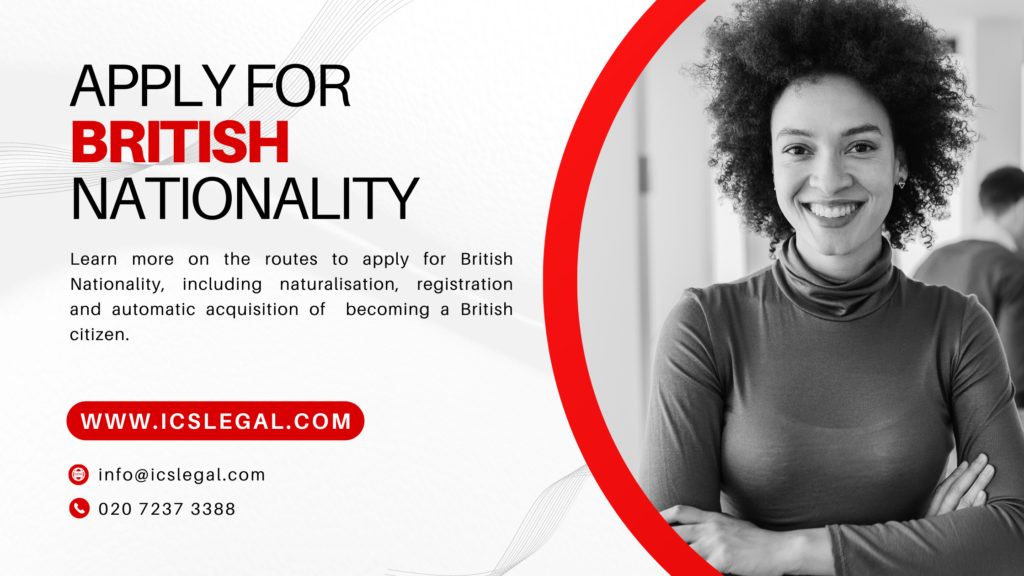
To apply for British nationality depending on your immigration status, connections to the British Empire or family can be a complex process.
The British Empire was the largest empire in history, ruling over 412 million people over a decade and having territories across the globe. You can read more information regarding the British Empire by clicking here.
As the empire was drawing back, the UK Government allowed countries to become independent, this led to most people losing their status as UK Citizens and Colonies, thus British nationality. Those who were permitted to apply for British nationality were allowed to do so and others were not allowed. This happened in most cases due to the country of independence.
As with any part of the law, British nationality laws’ continues to be amended and the introduction of the Nationality and Borders Act 2022, brings into new categories not found previously.
Here are some of the nationality routes that a person may qualify to become a British national.
The UK Home Office during the closure of the British Empire introduced 6 nationality categories and one of which allows a person to live in the UK.
Applying to become a British national through naturalisation and registration
A person who holds either indefinite leave to enter/remain or settled status in the UK, can look to become a British national. The application requires a person to meet the 3 years or 5 years of residency requirements.
Further to this, an applicant is required to demonstrate they are a person of good character and also meet the knowledge of life requirements. Once the application is lodged, the Home Office usually take around 6 months to process this and you would be allowed to remain in the UK whilst this is pending.
Following the current changes, a person may qualify to become a British citizen through registration. This is to demonstrate that you have an entitlement to apply due to your connection to the British Empire.
Applying for British nationality under discretion & special consideration
A person not able to meet the naturalization or registration requirements can still look to submit an application.
For example, if a person could not complete the life in the UK test or there are excessive absences for genuine reasons, an application can be still lodged.
When applying under this provision, you must be able to demonstrate your strong connections to the UK, this may include but is not limited to your work, contributions, and family, to name some of the considerations that are given when the application is lodged. It is recommended that any legal representation with evidence is enclosed to support the application.
Special cases in British nationality applications
The Nationality and Borders Act 2022 have introduced applications that a person can make based on special circumstances.
This includes but is not limited to those born in British territories who would have become a citizen of the United Kingdom and Colonies (CUKC).
Becoming British automatically by birth or descentIn most cases, following the changes implemented on the 20th June 2022, children born to non-British parents have entitled to make an application to become British. There are now discretionary powers given to the Home Office to permit applications that normally do not meet the requirements, however, due to serious and compelling grounds, an application can be still made.
In the application to become a British national, as a minor, there are no periods of residency required and also the application for those born in the UK, is generally considered in their favour.
Those who are born to settled parents are eligible to become British automatically. There are no requirements for those to apply for registration and can simply apply for a British passport. There are exceptions to this policy. If a person is British by descent themselves, then passing on nationality to children if they were born outside of the UK would require meeting special requirements.
The British Nationality Act 1981 (Immigration Rules Appendix EU) (Amendment) Regulations 2021
The Home Office has inserted a new change for those born to parents who are EEA nationals. The regulation extends to permit applications under special considerations.
Other forms of British Nationalities
Given the size of the British Empire, it was agreed upon that some where given forms of nationality to show connections to the UK but not be able to retain a right to residency on that alone.
In addition to British citizens there are 5 types of British national. These are:
• British overseas territories citizen.
• British national (overseas).
• British overseas citizen.
• British subject.
• British protected person.
The right to become or hold this status depends on a number of circumstances and obvious connections to the British Empire.
Further to this, those who have lived in the UK for 5 years under the above nationality status, would be entitled to become a British citizen. There are no requirements to meet the knowledge of life requirements.
Refusal of a British nationality application
Due to the complexity of the regulations, a number of British nationality applications are refused and are required to be appealed through the judiciary system. If an application is refused, you can challenge the decision and ask the Home Office to reconsider its position.
Following this, if the matter is not overturned, you can appeal the decision to the administrative court.
If you require any advice or help on your nationality application, please contact our team on 0207 237 3388.
Subscribe to our latest legal news
Subscribe to our newsletter to get latest offers & updates into your email inbox
